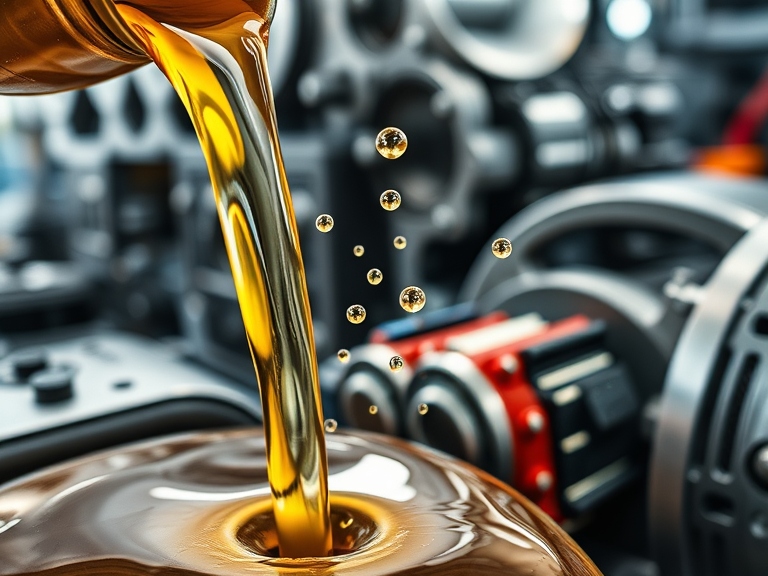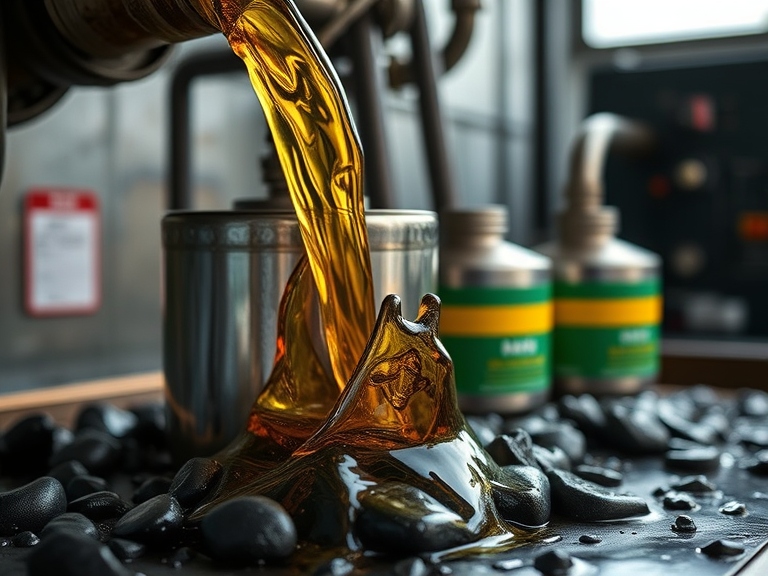Introduction to Oil Additives
Oil additives are chemical compounds mixed with base oils (such as engine oil or industrial lubricants) to enhance their performance, improve efficiency, and prolong the lifespan of engines, machinery, and equipment. These additives are essential for optimizing lubrication, reducing wear and tear, minimizing friction, preventing corrosion, and controlling the formation of deposits and sludge in engines.
In today’s high-performance world, whether for automotive engines, industrial machinery, or heavy-duty equipment, the role of oil additives has never been more critical. Without these additives, lubricants wouldn’t be able to meet the demanding standards of modern engines, machinery, and industrial systems.
At Gloria Holding Group, we specialize in supplying high-quality oil additives that are engineered to maximize the effectiveness of your lubricants. Whether you’re looking to improve the performance of vehicle engines, machinery, or manufacturing equipment, our range of oil additives is designed to meet the most rigorous industry standards.
What Are Oil Additives?
Oil additives are chemicals or compounds added to base oils to improve their performance in specific applications. These additives modify the properties of the oil to make it more suitable for the specific needs of an engine, industrial system, or machinery. Without additives, base oils would not be able to meet the demands of modern applications, such as high temperatures, high pressures, and extreme environments.
While oil itself is the primary agent for lubrication, additives are the key to optimizing its performance. Additives can be blended into the oil in various ratios depending on the intended use, and they serve a variety of functions, such as reducing friction, enhancing viscosity, preventing rust, and cleaning internal components.
Types of Oil Additives
Oil additives are typically classified based on their function and the benefits they provide. The primary categories of oil additives include:
- Viscosity Modifiers (VI Improvers)
- What They Do: Viscosity modifiers help the oil maintain a consistent viscosity across a wide temperature range. This is important because oils can become too thick at low temperatures (making it harder to circulate) or too thin at high temperatures (resulting in poor lubrication).
- How They Help: By improving the oil’s ability to flow at low temperatures and maintain film strength at high temperatures, viscosity modifiers ensure smoother engine startup and better protection under load.
- Example: Oils in modern engines are often multigrade (e.g., 5W-30), which requires a viscosity modifier to operate effectively in both cold and hot conditions.
- Detergents and Dispersants
- What They Do: Detergents and dispersants are additives that help keep the oil clean by preventing the formation of sludge, varnish, and deposits inside the engine. They do this by breaking up contaminants (like carbon and dirt particles) and keeping them suspended in the oil, so they don’t settle on engine parts.
- How They Help: By preventing sludge buildup, detergents and dispersants help maintain the efficiency of the engine and prevent corrosion. This also results in longer engine life and fewer oil changes.
- Example: Detergents are often used in oils for diesel engines to keep combustion by-products from clogging up the engine.
- Anti-Wear Additives
- What They Do: Anti-wear additives form a thin film on metal surfaces to reduce friction and prevent direct contact between moving parts, which can cause wear and tear. These additives are particularly important in high-pressure or high-load situations.
- How They Help: Anti-wear additives protect sensitive engine components such as pistons, rings, and camshafts from excessive friction and damage, reducing the need for costly repairs and extending the life of the engine.
- Example: Zinc dialkyldithiophosphate (ZDDP) is a common anti-wear additive in motor oils.
- Anti-Oxidants
- What They Do: Anti-oxidants help prevent the oil from breaking down when exposed to heat and oxygen. Oxidation is a natural process that occurs when oil is exposed to air and heat, leading to the formation of acids, sludge, and varnish.
- How They Help: By slowing down oxidation, these additives help prevent oil degradation, which extends oil life and keeps engines running smoothly without the buildup of harmful deposits.
- Example: Phenolic compounds and amines are commonly used antioxidants in oils.
- Corrosion Inhibitors
- What They Do: Corrosion inhibitors are chemicals that protect metal surfaces from rust and corrosion caused by moisture, acids, or other contaminants in the oil.
- How They Help: By reducing rust and corrosion, these additives protect sensitive engine parts like bearings and gears, ensuring longevity and performance.
- Example: Calcium sulfonates and barium compounds are common corrosion inhibitors used in oils.
- Foam Inhibitors
- What They Do: Foam inhibitors prevent the formation of foam in the oil. Foam can form when air is trapped in the oil during movement or agitation, which can lead to inadequate lubrication and damage to engine components.
- How They Help: By preventing foam formation, foam inhibitors ensure that the oil stays in contact with the engine parts, providing proper lubrication and reducing the risk of wear.
- Example: Silicone compounds are often used as foam inhibitors.
- Friction Modifiers
- What They Do: Friction modifiers help to reduce the friction between moving parts within the engine or machinery. This results in lower wear, improved fuel efficiency, and smoother operation.
- How They Help: By reducing friction, friction modifiers not only improve performance but also increase the efficiency of the engine or system, leading to fuel savings and reduced emissions.
- Example: Organic friction modifiers (OFM) are commonly used in modern automotive oils to enhance fuel efficiency.
- Seal Conditioners
- What They Do: Seal conditioners help maintain the flexibility of rubber seals in engines and transmissions, reducing the risk of leaks.
- How They Help: These additives ensure that seals remain in good condition over time, helping to prevent leaks and reduce maintenance costs.
- Example: Ester-based seal conditioners are often used in automotive oils.
Uses and Benefits of Oil Additives
The primary benefit of oil additives is their ability to enhance the performance of the base oil in various ways. Depending on the additives used, the performance benefits can include:
- Improved Engine Protection
- Oil additives reduce wear and tear, ensuring better protection for vital engine parts like pistons, cylinders, and valves. This is crucial for extending engine life, improving reliability, and reducing the frequency of repairs.
- Enhanced Lubrication Efficiency
- Additives help oils maintain their viscosity and reduce friction, which minimizes heat generation and wear. This leads to smoother operation, improved fuel efficiency, and reduced energy consumption.
- Cleaner Engines and Systems
- Detergents and dispersants help keep engines and machinery clean by preventing the formation of harmful deposits and sludge. This ensures optimal performance and reduces the need for frequent maintenance.
- Corrosion Prevention
- Corrosion inhibitors ensure that metal components remain free of rust, reducing the risk of long-term damage and increasing the durability of the equipment.
- Extended Oil Life
- Additives such as anti-oxidants prevent oil from breaking down prematurely. This leads to longer oil life, reduced need for frequent oil changes, and better overall cost-effectiveness.
- Fuel Efficiency
- Friction modifiers and viscosity improvers enhance fuel efficiency by reducing the amount of energy needed to overcome friction between engine parts.
- High-Temperature Stability
- Many additives help oils maintain their effectiveness under high temperatures, ensuring that lubrication remains efficient even in extreme conditions.
- Environmental Benefits
- By improving fuel efficiency, reducing emissions, and extending the lifespan of oils, oil additives help reduce the environmental impact associated with frequent oil changes and engine wear.
Gloria Holding Group’s Oil Additives
At Gloria Holding Group, we offer a wide range of high-quality oil additives designed to improve the performance, efficiency, and longevity of your engine oils and lubricants. Our products are carefully sourced and manufactured to meet the most stringent industry standards, ensuring that your engines and machinery operate at their peak potential.
Our Oil Additive Products Include:
- Anti-Wear Additives
- Viscosity Modifiers
- Detergents and Dispersants
- Corrosion Inhibitors
- Friction Modifiers
- Anti-Oxidants
- Seal Conditioners
- Foam Inhibitors
We understand that every engine, machine, and system has its own specific requirements. That’s why we work closely with our clients to provide custom solutions, ensuring that the right additives are used for the best performance.
Conclusion
Oil additives play a crucial role in enhancing the performance and longevity of lubricants, engines, and machinery. Whether you’re looking to reduce friction, prevent wear, or keep your equipment clean, the right additives can make all the difference in ensuring efficiency, durability, and optimal operation.
At Gloria Holding Group, we are committed to providing the highest quality oil additives to meet your specific needs, helping you maximize performance while reducing costs and maintenance.
If you’re looking for premium oil additives that can enhance your operations, contact us today to learn more about our products and how they can improve your equipment’s performance.



